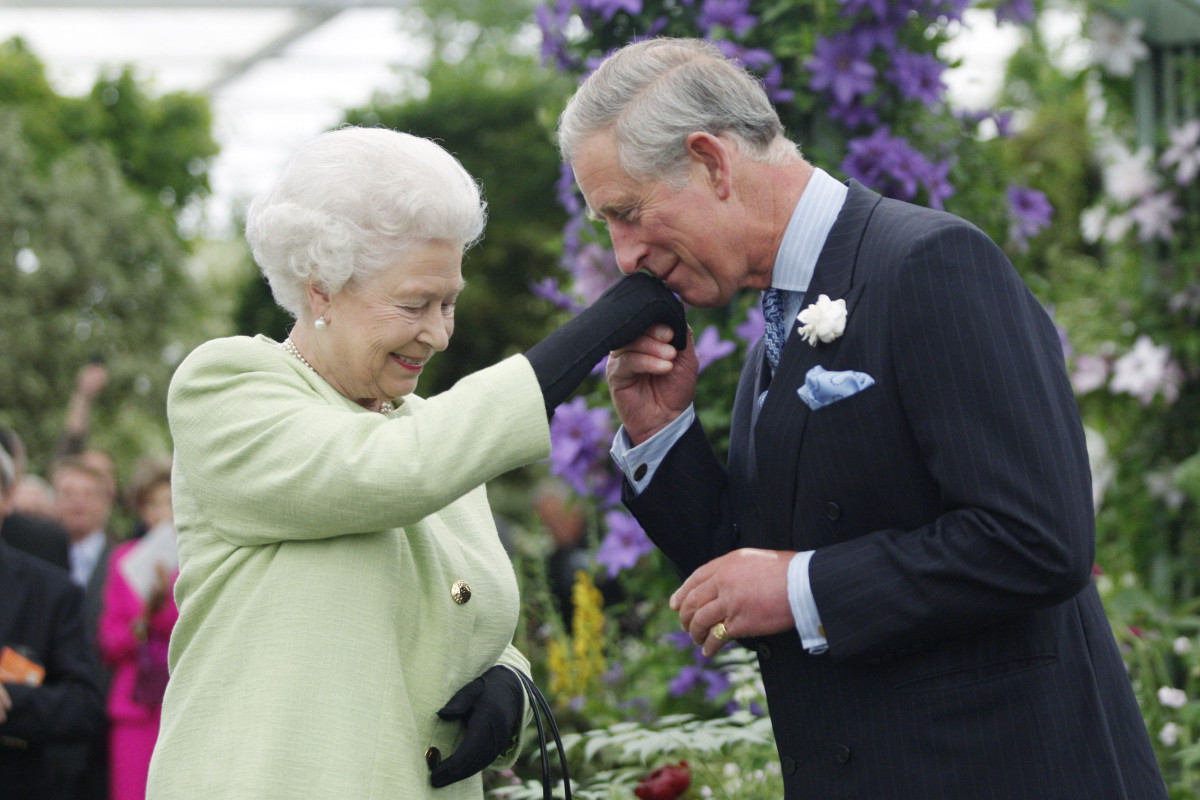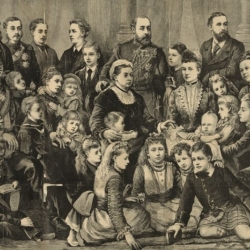| Source (Hebrew) | Translation (English) |
|---|---|
The Minister takes the Scroll of the Torah, and reads the following:— | |
הַנּוֹתֵן תְּשׁוּעָה לַמְּלָכִים וּמֶמְשָׁלָה לַנְּסִיכִים מַלְכוּתוֹ מַלְכוּת כׇּל עוֹלָמִים |
He who giveth salvation unto kings and dominion unto princes, whose kingdom is an everlasting kingdom,— |
הוּא יְבָרֵךְ אֶת אֲדוֹנֵֽינוּ הַמֶּֽלֶךְ |
may he bless Our Sovereign Lord, King GEORGE (Ⅵ), Our gracious Queen ELIZABETH, MARY the Queen Mother, The Princess ELIZABETH, and all the ROYAL FAMILY. |
מֶֽלֶךְ מַלְכֵי הַמְּלָכִים בְּרַחֲמָיו יְחַיֵּֽיהוּ וְיִשְׁמְרֵֽהוּ וּמִכׇּל צָרָה וְיָגוֹן יַצִּילֵֽהוּ |
May the supreme King of kings in his mercy preserve the King in life, guard him and deliver him from all trouble and sorrow. |
וְיִתֵּן בְּלִבּוֹ וּבְלֵב כׇּל־יוֹעֲצַיו רֽוּחַ חָכְמָה וּבִינָה לְהַחֲזִיק שְׁלוֹם הַמַּלְכוּת וְשַׁלְוַת עַמּוֹ וְלַעֲשׂוֹת חֶֽסֶד וֶאֶמֶת עִם כׇּל יִשְׂרָאֵל׃ |
May he put into his heart and into the hearts of all his counsellors, a spirit of wisdom and understanding that they may uphold the peace of the realm, advance the welfare of the nation, and deal kindly and truly with all Israel. |
בְּיָמָיו וּבְיָמֵֽינוּ יִפְרֹשׂ אָבִֽינוּ שֶׁבַּשָׁמַֽיִם סֻכַּת שָׁלוֹם עַל־כׇּל־יוֹשְׁבֵי תֵבֵל וּבָא לְצִיּוֹן גּוֹאֵל וְנֺאמַר אָמֵן׃ |
In his days and in ours, may our Heavenly Father spread the protection of peace over all the dwellers on earth; and may the Redeemer come unto Ẓion; and let us say, Amen. |
This is the formula of the prayer for the government established by chief rabbi Joseph H. Hertz as introduced in 1935 for the Royal Jubilee Service and included in his revised Authorised Prayer Book, vol. II (1942/3), p. 506-507. His notes on the prayer are included below:
PRAYER FOR THE GOVERNMENT
Loyalty to the State is ingrained in the Jewish character. The Jew has often shown himself to be the intensive form of any nationality whose language and customs he adopts—‘‘the Piel of the Peoples ” (Emma Lazarus). He has at all times placed love of country high among religious precepts. A recent historian points out that Jews are by nature conservative; and that in all those countries in which persecution has not embittered their life, they are no more radical than the non-Jewish members of the social class to which they belong (Vallentin).
This Jewish feeling of loyalty to King and Country has its roots far in the past. ‘‘My son, fear thou the Lord and the king, and meddle not with them that are given to change” (Proverbs 24.21) is a warning against revolutionary intrigue. “Seek ye the peace of the city whither I have caused you to be carried away captive, and pray unto the Lord for it; for in its welfare shall be your peace” (Jeremiah 29.7) is the exhortation of the Prophet to the exiles in Babylon. From Ezra 6.10, it is evident that when the returned exiles rebuilt the Temple, sacrifices and prayers for the King and the Royal Family formed part of the cultus. A century later, when Alexander the Great, inflamed against the Jewish nation by slanderous accusations, was bent on destroying Jerusalem, he was met by the High Priest and the elders, who pleaded: “Wilt thou, O mighty king, destroy the Temple in which sacrifices and prayers are offered for thee and thy land?” Both Philo and Josephus speak of prayers that were regularly offered for the Roman Emperor. In their day, the immemorial custom of praying for the welfare of Ruler and State had become the fixed rule.
It is true that, when the deranged Emperor Caligula (37-41) ordered his image to be placed in the Temple at Jerusalem, the Jews alone in the world-wide Roman Empire refused to pay divine honours to him. They pleaded with the Roman commander that, if he insisted on setting up the image, he would first have to sacrifice the whole Jewish people; as they would rather die than transgress the Commandment against image-worship. At this, the Roman commander “felt both astonishment and pity on account of their invincible regard for their religion, and their courage which made them ready to die for it”? (Josephus). Only the sudden death of the Imperial madman saved the defenceless population from fearful massacre. In the next generation, on the very brink of the War against Rome, Rabbi Chanina taught: “Pray for the welfare of the government, since but for the fear thereof men would swallow each other alive”; see p. 647. A hundred and fifty years later, Mar Samuel of Nehardea laid it down for all time that, in civil matters, the law of the land is as binding on Jews as the religious commandments of their own Faith, דינא דמלכותא דינא. Graetz places this decision of Mar Samuel on a par with the teaching of Jeremiah. They made it possible for Jewry to exist in the Dispersion.
Strangely enough, the exact wording of these ancient prayers has not come down to us. The earliest formula known is not older than the eleventh century prayer at Worms: “May He who blessed our fathers Abraham, Isaac and Jacob bless our exalted Kaiser. May He bless and prosper his undertakings; establish his throne in justice, so that righteousness rule in the land; and grant life and peace to him and his seed after him. And let us say, Amen”. In the communities of Spain, the Prayer for the King was recited even on Mondays and Thursdays, as well as on the Eve of the Atonement (Abudraham). Presumably it was the one which the Spanish Jews brought with them when they came to Holland; namely, “He who giveth salvation unto kings”. It was first printed in 1658; and, as its wording seemed to agree with the oral tradition among the Ashkenazim, it soon found its way into all Prayer Books. How widespread was its use is evidenced by the following fact. When, in 1666, the false Messiah Sabbethai Tsevi appeared in Smyrna, and a tidal wave of hysteria swept over the Jewish communities from Bagdad to Amsterdam, this prayer was adapted to proclaim him; and Heaven was entreated to “bless, guard, protect, and help, exalt, magnify, and highly aggrandize” the Messianic pretender.
It was the Jews of Napoleon’s day who were the first to depart from the generally accepted form of Prayer for the Government. In the new prayers which they composed, they omitted the entreaty that God incline the heart of the rulers to have pity on Israel, and that the time of deliverance of Ẓion draw near. “This passage was no longer appropriate, in a prayer composed after the emancipation of the Jews”, a French rabbinical apologist wrote fifty years ago. Alas, he could not see that emancipations, even French emancipations, might be repealed.
In 1895, the British Rabbinate was induced to modify the words “put compassion (רחמנות) into the Queen’s heart and into the hearts of her counsellors and nobles, that they may deal kindly with us and with all Israel”. They were changed into “put a spirit of wisdom and understanding into her heart and into the hearts of all her counsellors… that they deal kindly and truly with all Israel”. The elimination of the supplication for רחמנות was in some quarters hailed as a great improvement. Nevertheless, the older form was a truer reflection of reality for millions of Jews, even before the Nazi Terror.
The shortened form of the prayer printed above was introduced by the writer of this commentary at the Royal Jubilee Service in 1935. Its concluding sentences sound the universalist note—‘‘In his days and in ours, may our Heavenly Father spread the tabernacle of peace over all the dwellers on earth”. The Jewish humanist, Azariah de Rossi (1513-1578) maintained that, like the High Priest of old, Jews are to pray for the whole of mankind:—‘‘We, who are scattered to the four winds of heaven, should supplicate Almighty God for the peace of all the inhabitants of the world; that no nation lift up sword against nation; and that He remove from their hearts all strife and hatred: for in their peace we too have peace”.
Source(s)


“הַנּוֹתֵן תְּשׁוּעָה | Prayer for the Royal Family of King George Ⅵ (1942)” is shared through the Open Siddur Project with a Creative Commons Public Domain Dedication 1.0 Universal license.










Leave a Reply